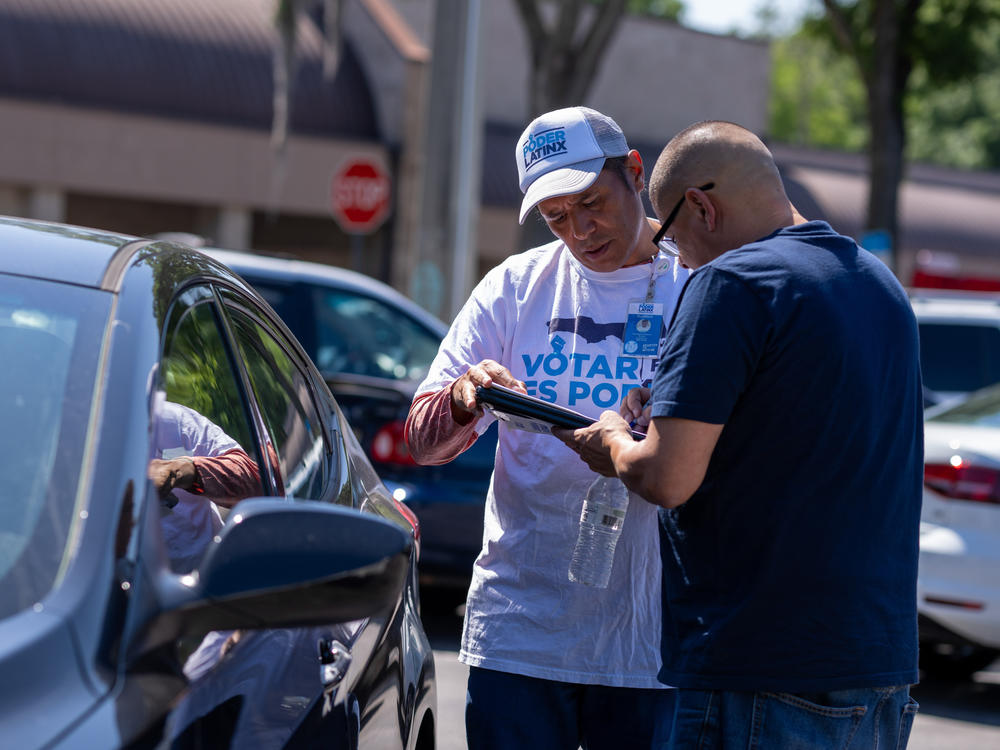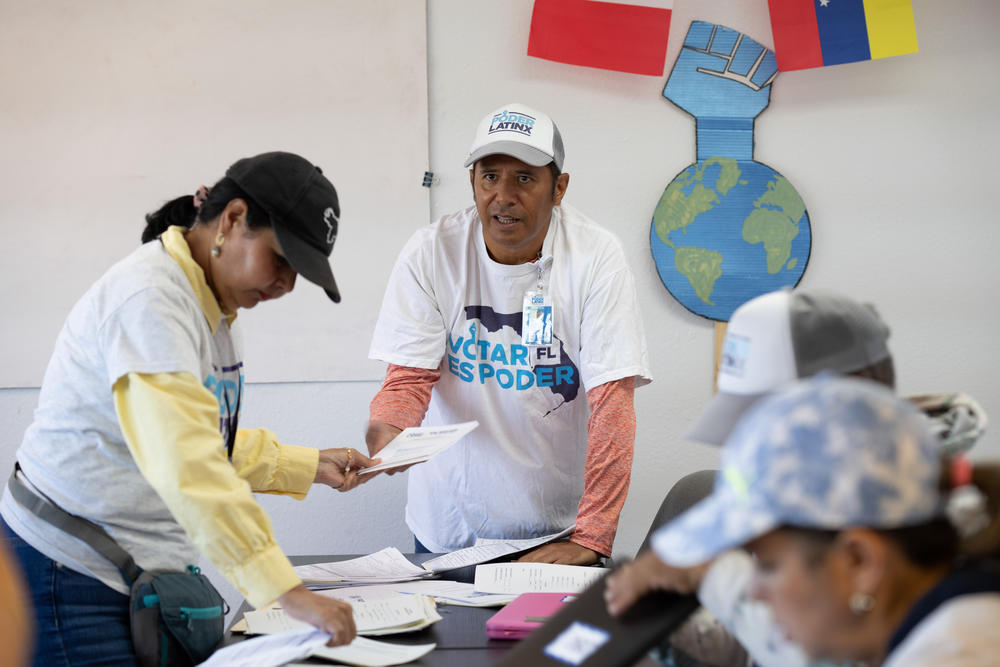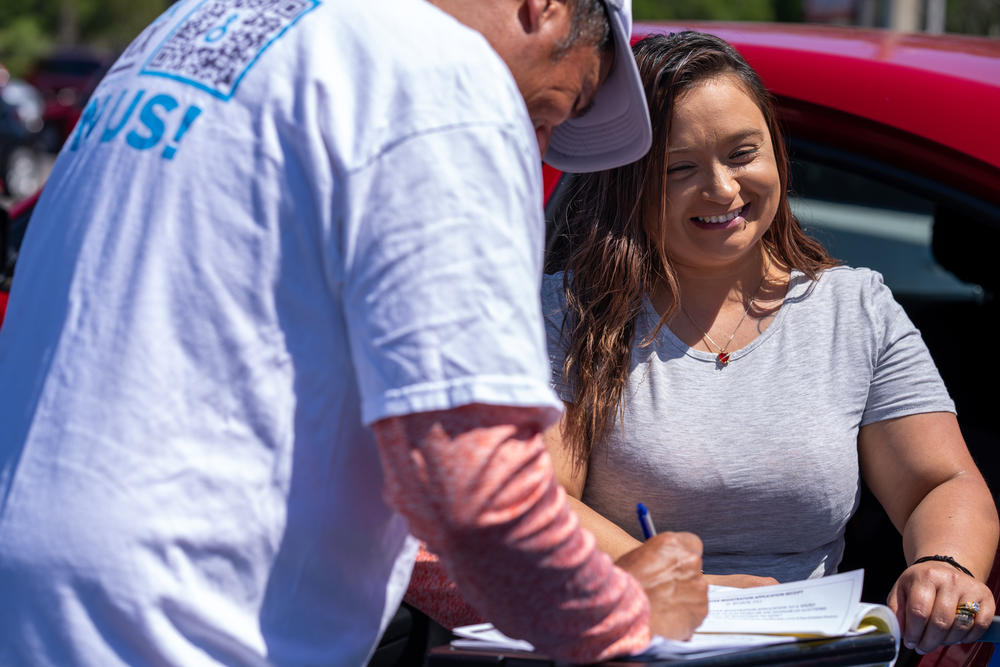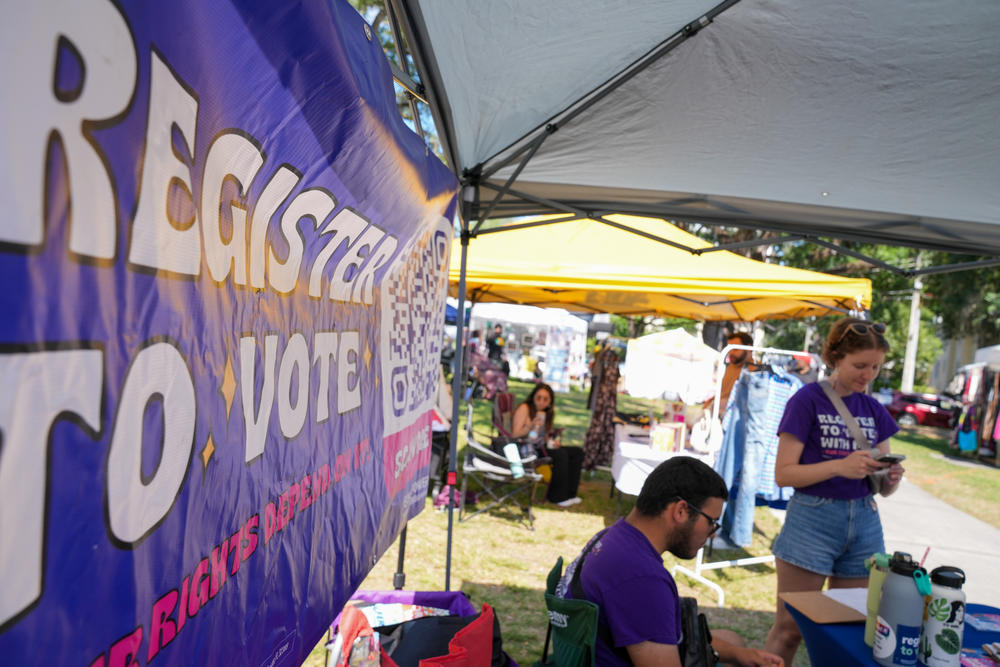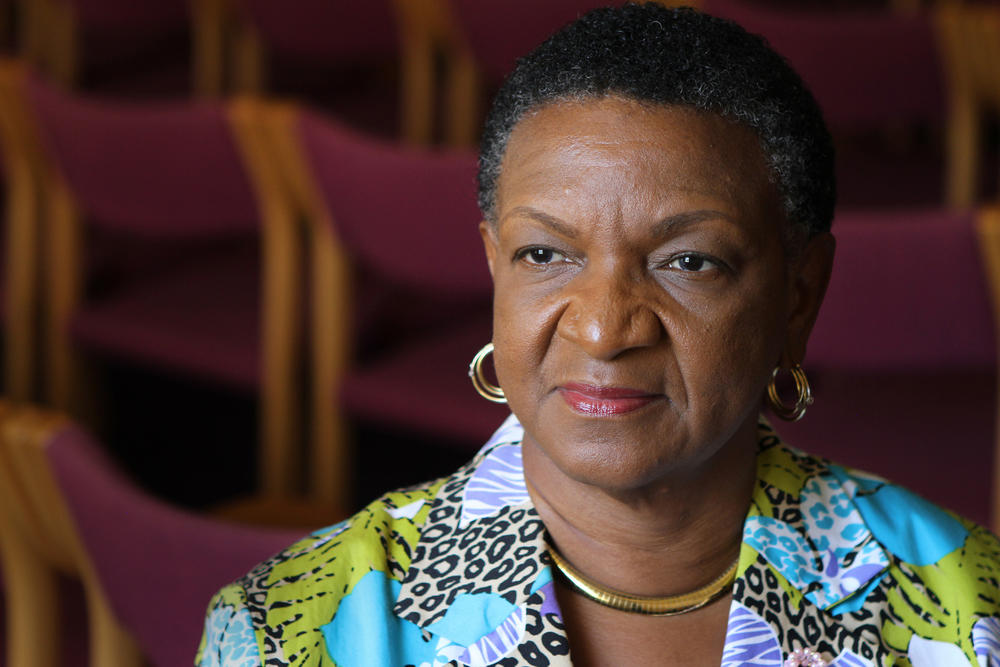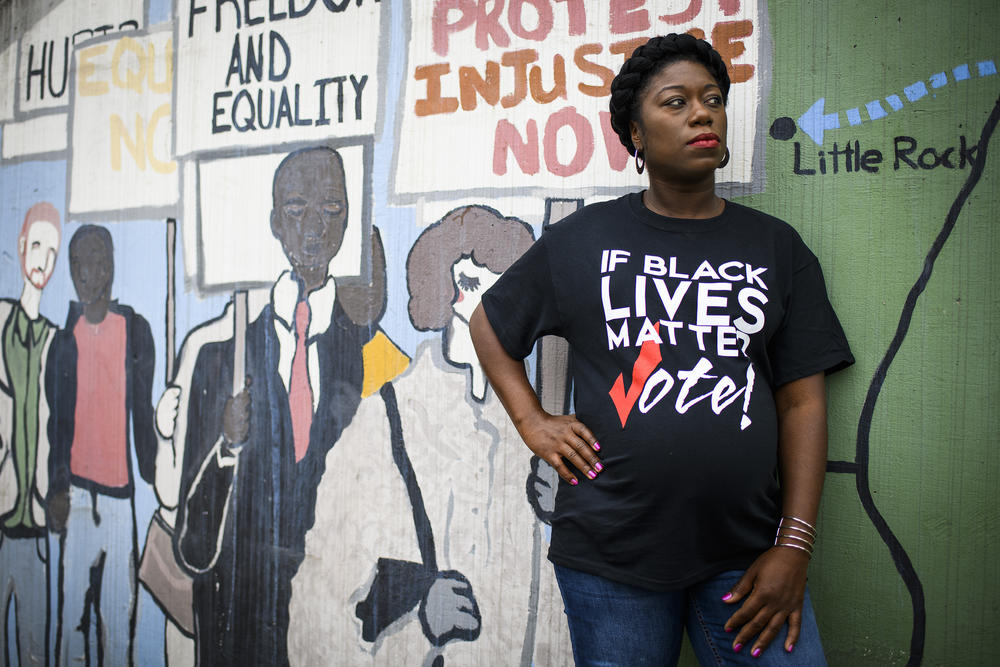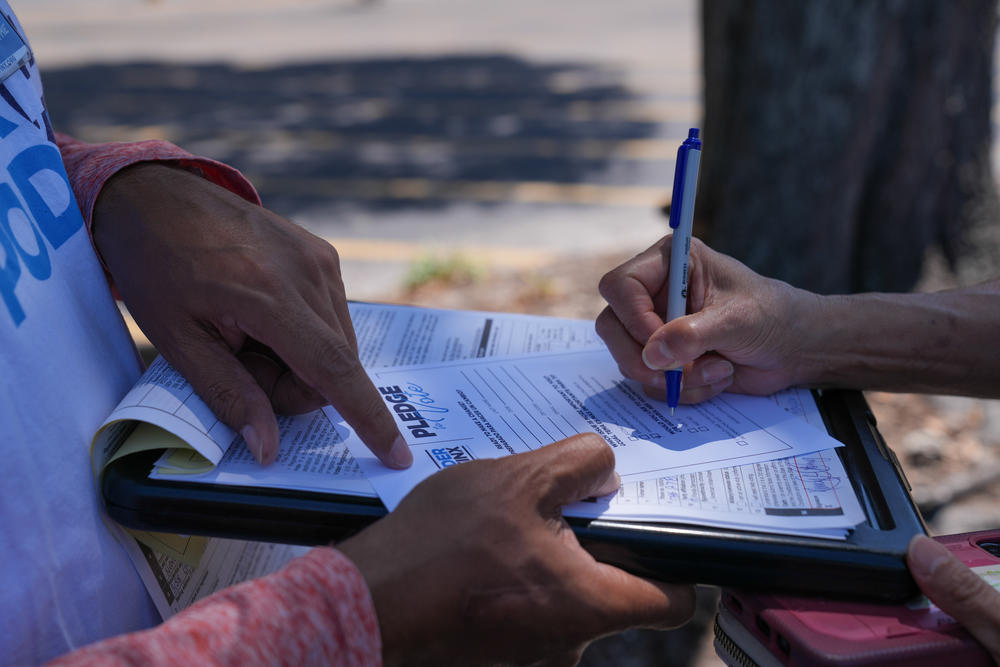Section Branding
Header Content
Groups that register voters are feeling besieged by new state laws
Primary Content
ORLANDO, Fla. — Carolina Wassmer piloted a gray SUV around the city, dropping off canvassers from the civic engagement group Poder Latinx one by one. It was a muggy day, but the canvassers hopped out with their clipboards and pens, ready to engage in a longstanding American tradition: the voter registration drive.
Poder Latinx's canvassers were fanning out to help eligible voters in Latino neighborhoods join the rolls or update their registrations. But the work of such groups, which often focus on young voters and voters of color, is getting harder in Florida and around the nation.
Since the 2020 election, at least six states have passed legislation cracking down on voter registration drives. Many groups view the laws — enacted by Republicans in Florida, Idaho, Kansas, Missouri, Montana and Tennessee — as an existential threat to their work, and several have shut down operations rather than risk financial penalties or prison time.
"It's been a nightmare in every way," said Davis Hammet of Loud Light in Kansas. His group halted voter registration efforts after a 2021 law imposed criminal penalties for impersonating an election official, something engagement organizations fear could be inadvertent. "If you're [convicted of] a felony, you lose your right to vote. So you could lose your right to vote for registering voters," Hammet said.
In Florida, state legislators in 2022 upped the maximum fine a voter registration group could receive from $1,000 to $50,000. The next year, they boosted it again to $250,000. They also limited how and where organizations can return forms, and barred non-U.S. citizens and people with certain felonies from doing the work.
"These are rules that everybody needs to tighten up a little bit," said Florida Rep. Rick Roth, a Republican who supported the changes. "You have to do it the right way. We don't want any hiccups."
Several Florida groups shut down their voter registration drives after the 2023 law. "As a consequence of all these threatening provisions, the League no longer collects paper voter registration applications," said Cecile Scoon of the League of Women Voters of Florida. The League has registered tens of thousands of Floridians, but a $250,000 fine would be greater than its annual budget in recent years.
"We're not as effective as we once were," Scoon said.
Loading...
State data shows that in the months after the Florida law took effect in 2023, registrations through drives fell by 95%, compared with the same months four years earlier.
Republican legislators in Florida cite concerns about fraud and trust in elections as reasons for the new restrictions. Voter registration groups have missed deadlines for returning applications in some cases, leaving potential voters ineligible for upcoming elections. And six canvassers were arrested in April 2023 after allegedly falsifying 58 voter registration applications in two counties. Yet a state investigator in Florida wrote that the people involved "were not part of an organized criminal conspiracy to corrupt the election process." And there's no broader indication of widespread fraud in voter registration drives across the country.
Americans can't vote without being registered, except in North Dakota, and the registration process represents the largest barrier to casting a ballot for many potential voters. For over a century, voter registration drives have set up shop at parks, churches, grocery stores, campuses and community events to register eligible Americans.
These drives — with a long history stretching back to women's suffrage and the Civil Rights movement — register some of the nation's hardest-to-reach potential voters. They are especially key in states, like the six with new restrictions, that do not have automatic voter registration.
Advocates say many of the voters they register would be left out of the elections process otherwise. Black and Latino voters, along with naturalized citizens and people who didn't graduate from high school, are more likely to rely on third-party voter registration efforts, according to census data.
And Republicans elsewhere are seeking to limit this form of voter outreach. Legislators in at least seven states considered bills this year, according to data from the Voting Rights Lab. The proposed legislation sought to erect new barriers to voter registration drives, create new criminal penalties or, in the case of Indiana, make such drives illegal entirely.
"This is part of a national effort," said Nimrod Chapel Jr. of the Missouri NAACP.
"The better democracy"
On a hot Saturday, Humberto Orjuela paced the parking lot of Presidente Supermarket #49 east of downtown Orlando. Friendly and soft-spoken, Orjuela was approaching shoppers and asking if they wanted to register to vote.
"When more people participate in elections, the better democracy we will have," Orjuela said in Spanish between conversations with potential voters. He typically talks to shoppers while they're loading up their car with groceries, when they feel less rushed.
Around lunchtime, he approached two women leaving the store. The sisters weren't on the voter rolls but wanted to be. Orjuela walked each sister through the application, section by section. When Wilmarie Rivera got to the section about political parties, she was stumped about which to register with. Her sister piped in, asking which presidential candidate she preferred.
"Ah, Trump!" she responded with a laugh. "Eres Republicana," Orjuela noted. He helped Rivera finish the paperwork, and the two sisters climbed in their red Dodge Charger and drove off.
Orjuela does his outreach work in Spanish. Wassmer, Poder Latinx's Florida program director, said that makes a difference. "People don't feel confident. Or they're not sure how to register, or why to register," she said. "So the language really helps meeting people where they're at."
But the Florida Legislature wants Orjuela to stop registering voters. A 2023 law, SB 7050, banned noncitizens like him from conducting voter registration drives, even though lawful permanent residents can handle registration applications as employees of Florida's state or local election offices. The new restriction had been paused by a court, allowing Orjuela to continue registering voters. On Wednesday, the same court said the state cannot enforce the provision.
Orjuela did civil engineering work in Colombia before coming to the U.S. He can't vote himself, so the unglamorous, sweaty work of registering voters in parking lots is his contribution. He considers it a successful day if he can help around 10 Floridians join the rolls or update their registrations.
But Orjuela said he was concerned about Florida's law. "It's a law that seems unjust to me, because if one has the right to work, well, one should be able to exercise that right. It shouldn't come with so many limitations," he said.
Legislators also shortened the window for groups to send completed applications to elections officials, from 14 days to 10; they barred people with certain felonies, including elder abuse, sexual offenses and perjury, from registering voters; they required groups to provide a receipt for each application; and they added a mandate that groups re-register with the state after every election cycle.
Additionally, SB 7050 criminalizes retaining the personal information of people registering to vote, now a felony punishable by up to five years in prison. (This has also been blocked by a court for now.) Groups say information like addresses and phone numbers had been a key part of their voter outreach.
The legislation sailed through Florida's heavily Republican Legislature last spring, with the state's election director, Maria Matthews, commenting in an internal email that "the bill appears to have the legs of [a] teen cross-country sprinter." According to deposition testimony, many of the law's provisions were recommended by Matthews and her colleagues at Florida's Department of State, which oversees elections. The head of the agency, Cord Byrd, is a former Republican state representative and close ally of Gov. Ron DeSantis.
In a statement, Department of State spokesperson Mark Ard said that "Floridians put a great deal of trust in [voter registration groups] to ensure that their voter registration applications are submitted to the appropriate Supervisors of Elections in a timely manner. However, that is unfortunately not always the case."
The agency's election crimes unit increased its scrutiny of voter registration groups in 2023, saying in its annual report that issues with these groups "have plagued the state for years." It noted the agency received "over 50 civil complaints" from county election officials about groups returning applications late.
But Daniel Smith, a political science professor at the University of Florida, said there are no widespread issues with third-party voter registration groups, sometimes referred to as 3PVROs.
"There are certainly some bad apples with respect to the efforts on the ground. But they are rare," he said.
Only 1.2% of voter registration applications submitted by these groups from 2016 to 2023 were alleged by the Department of State to have violated statutes. That's according to plaintiffs in a lawsuit challenging SB 7050. A federal court heard arguments in the suit, brought by civic engagement groups and voting rights organizations, in April. A decision is expected later this year.
Voter registrations way down, fines way up
Smith submitted an expert report for the plaintiffs, finding that more than 2.1 million Floridians relied on these groups to register or update their voter registrations in the last decade.
"Not every individual is the same. Not every individual has the same opportunities to register or re-register. They have various types of barriers. Maybe it's transportation, maybe it's information, maybe it's concern about health, maybe it's financial," he said. "3PVROs really fill the gap."
Black and Latino voters are far more likely to rely on voter registration drives than white voters. In his report, Smith found that 12.8% of Black voters in Florida had used voter registration drives to register or update their registration since 2012.
That compared to 10.3% for Latino voters, and just 2% for white voters.
Loading...
In deposition testimony, the state elections director, Matthews, acknowledged that she was aware of data showing voter registration drives disproportionately reached Black and Latino voters.
Republicans reject the notion that race has anything to do with the laws. "This is not targeting anybody. This is saying we are concerned" with how voter registration groups are operating, Roth said. "I am personally concerned."
Joe Scott, supervisor of elections in South Florida's Broward County, doesn't share those concerns. "There's a segment of the population that really relies on these groups being able to come out and do a voter registration drive in order for them to get registered to vote," he said.
Scott, a Democrat, said Broward County has seen "a dramatic decrease" in voters registering through drives since SB 7050 became law. That echoes a statewide trend. Just 3,860 Floridians registered through drives in the first three months of 2024. During the same time frame in the last presidential election year, 40,963 voters did so.
That massive drop is driven, in part, by groups that responded to the new laws by stopping their voter registration work. LaVon Bracy's Faith in Florida is one of them.
Bracy is a longtime civil rights activist. She was the first Black student to graduate from Gainesville High School in 1965 and has personally registered hundreds of voters in Florida.
"The restrictions are unbelievable," she said in the Orlando church she and her husband founded. Bracy decided to halt voter registration drives last year because Faith in Florida couldn't afford to pay fines of up to $250,000 per year if something went wrong. "It was a necessary decision, financially. We had to pivot," she said.
Fines issued to voter registration groups have soared in recent years, according to documents in the lawsuit. They rose from under $4,000 in 2019 to over $64,000 last year.
To avoid fines and criminal sanctions, Faith in Florida has begun sharing QR codes with potential voters, directing them to the state's registration website. That means they are not directly registering people, and staff are unable to return applications on voters' behalf.
Bracy fears the new laws mean Faith in Florida will reach many fewer voters, including senior citizens who may struggle with the state's online registration system.
She sees a racial motive behind the bills regulating voter registration drives, particularly following the 2018 gubernatorial election, in which DeSantis won by less than half a percentage point against Democrat Andrew Gillum, who is Black. "The aim is to keep Black and brown people from voting," Bracy said. "If it wasn't so important, they wouldn't come up with all of these rules."
"Making it scary to do this work"
Florida is not alone.
Five other Republican-controlled states have passed laws restricting voter registration drives since the 2020 election. Many of the laws share similarities and have been challenged in court.
"What I see as uniting a number of cases I've worked on, both past and present, is making it scary to do this work," said Danielle Lang of the Campaign Legal Center, pointing to the financial and criminal provisions in the laws. Lang's organization has been involved in legal challenges in Florida, Montana and Missouri.
The active cases in several states mean that laws can go into effect, then be blocked by courts, only to later be ruled constitutional — the legal sands shifting under the ground of organizations forced to decide if and how they want to register voters.
Loading...
In Idaho, Sam Sandmire's BABE VOTE, which seeks to register young voters on college campuses, at music festivals and elsewhere, has been grappling with the fallout from a 2023 law.
Youth registration in Idaho soared in recent years, growing faster between 2018 and 2022 than in any other state, according to a Tufts University analysis.
The law passed by the state Legislature established the types of identification voters could use to register and prove residency, which include a deed of trust, credit card statement or concealed weapons license, but does not include student ID. "That hurt, that forced us to suspend our voter registration drives," Sandmire said.
BABE VOTE's lawsuit called the changes "a surgical attack on Idaho's youngest voters," but the case was rejected by the state Supreme Court in April. (A separate case in federal court over the law remains active.)
The group's volunteers restarted registration drives this spring, after a nine-month pause. But Sandmire said the changes to ID requirements have meant the group has to turn away perhaps a third of eligible Idahoans they encounter who are interested in registering.
In Missouri and Kansas, new laws triggered concern among voter registration groups that their work risked criminal penalties.
The Kansas law criminalizes impersonating an election official, in language that civic engagement groups say is so vague that they've been forced to suspend operations. (An attorney defending the law for the state said in a hearing that "I will acknowledge that this legislation did not represent the high water mark of legislative craftsmanship.") Groups say that their staff and volunteers carefully explain who they are but are sometimes mistaken for government employees anyway — and now could face a fine of up to $100,000 and 17 months in prison over that mistake.
"This is me sending young people out, knowing that I might be sending them to get a felony charge that could just wreck their life," said Hammet, the Loud Light president. "This is not even a misdemeanor, it is a felony charge."
His group had been planning an event celebrating the anniversary of the 26th Amendment, which reduced the minimum voting age to 18. But Hammet canceled it after the law passed.
"So we couldn't register voters on the anniversary of young people getting the right to vote," he said.
A legal challenge is ongoing, but the process has dragged on for years. Hammet said his organization has missed out on registering thousands of voters.
Missouri's law, passed in 2022, has also been challenged in court, with a trial scheduled for August. A state judge there granted a preliminary injunction, meaning aspects of the law are not currently in effect. The NAACP and other plaintiffs say vague provisions leave them at risk of criminal sanctions.
The law bans payment for voter registration work, which the Missouri NAACP has interpreted to include travel reimbursement as well as food and drinks for volunteers. "You can't give them doughnuts, you can't give a volunteer a T-shirt. And so it really gets draconian in that way," said Chapel, who fears the restrictions could end his group's ability to conduct voter registration drives at back-to-school events and on Juneteenth.
The law also requires people who solicit more than 10 applications to be registered to vote with the state, freezing out Missourians whose felony sentences bar them from casting ballots.
"It really brings home what the folks who passed the law are trying to do, which is restrict our ability to register new voters at all," Chapel said.
In a response in court, attorneys for the state denied the allegations made by the NAACP and other groups. Andrew Bailey, Missouri's attorney general, told the Center for Public Integrity and NPR that he was "proud to be leading in the fight to ensure the integrity of Missouri's elections."
A 2023 law in Montana created criminal penalties for voters who "purposefully remain registered" in another jurisdiction when registering in a new one. Groups that conduct registration drives fear their staff and volunteers could be criminally charged for helping people register, and filed suit. In late April, a federal judge prevented the state from enforcing the provision for now.
Millions of voters register through drives
Voter registration drives have been a fixture of the elections landscape for nearly as long as registration has existed.
"What people understood from the beginning was that there was a role for groups to be engaged in helping people clear that hurdle," said Joshua Douglas, a law professor at the University of Kentucky.
Douglas studied the history of registration drives and found that they assist millions of voters each cycle.
Drives gained force during eras when the franchise expanded. "The big pushes for voter registration were women's suffrage, the Civil Rights movement," he said. The National Voter Registration Act of 1993 also set off a wave of registration by standardizing application paperwork.
Efforts to restrict these drives have a history, too. A 2012 report from the Brennan Center for Justice, which advocates for expanded voter access, found that the practice had "come under attack" nationally.
Among the legislation proposed at the time was a 2011 law in Florida that added several new restrictions, including a requirement that groups return applications within 48 hours. A federal judge permanently enjoined many aspects of the law in 2012, but an academic report found that voter registrations among Black Floridians were impacted more than other groups while the law was in effect.
A 2019 law in Tennessee, establishing hefty fines and prison time, met a similar fate: A federal court blocked it.
The legislative attention came one year after the Tennessee Black Voter Project collected over 90,000 voter registration applications. "There is always a backlash to our efforts to claim progress, and to have any sort of semblance of equality," said Charlane Oliver, a nonprofit executive who was a key figure in the registration drive.
Oliver, a Democrat, was elected to the state Senate in 2022. This year, she watched the introduction of new legislation restricting such drives. Several of the provisions echo Florida's recent laws, including requiring groups to provide a receipt, establishing fines and barring people with certain felonies from doing the work.
In a statement to Public Integrity and NPR, Tennessee Rep. Tim Rudd, the bill's sponsor, said he drew inspiration from Florida. He thought Florida's $50,000 fine for people with certain felonies doing voter registration work was high, though, and proposed a $5,000 one.
Rudd, a Republican, rejected the argument that Oliver and others have made that legislation restricting voter registration drives harms Black voters. He said the bill "has nothing to do with race, but everything to do with protecting Tennesseans from voter registration fraud and elder abuse via reasonable limited guidelines and restrictions. Those opposed to this legislation must not want accountability, plain and simple." The measure was signed into law by Tennessee Gov. Bill Lee earlier this month.
At least seven states besides Tennessee have considered legislation this year to ban or restrict voter registration drives: Arizona, Florida, Indiana, Kansas, Louisiana, New York and West Virginia.
"It is a really disturbing trend that these types of bills are circulating nationally," said Saumya Sarin, a volunteer with Idaho's BABE VOTE.
Bills in three of those states remain active and could become law, according to the Voting Rights Lab.
Advocates say drives reach many groups beyond Black, Latino and young adults who face barriers to voting. "Voter registration drives are really important across Indian Country," said Jacqueline De León of the Native American Rights Fund. "Too many Native Americans simply are never asked the question, 'Would you like to register to vote?'"
Registering online is not a viable option for some Americans. "A lot of our rural communities don't even have broadband access. So how are they going to get registered to vote online?" said Tennessee's Oliver.
Small shifts in voter registration could play a key role in what polls show is an exceedingly close presidential election. And the makeup of the electorate is poised to affect the down-ballot races that will determine who serves as governor, mayor, state supreme court justice and more in communities across the nation. In Florida, ballot measures on marijuana and abortion access could come down to small margins.
Not everyone who registers will vote. But anyone who doesn't register can't vote.
Voter registration drives "raise awareness," said Scott, the supervisor of elections for Broward County's 1.9 million residents. "They'll be there, they'll set up a table, and they'll do their voter registration drive there, for folks who maybe aren't being exposed to this idea that you need to get registered to vote."
Correction
An earlier version of this story included a quotation in which the speaker said those charged with a felony lose their right to vote in Kansas. A felony conviction would prevent a Kansan from voting while the sentence is in effect.
